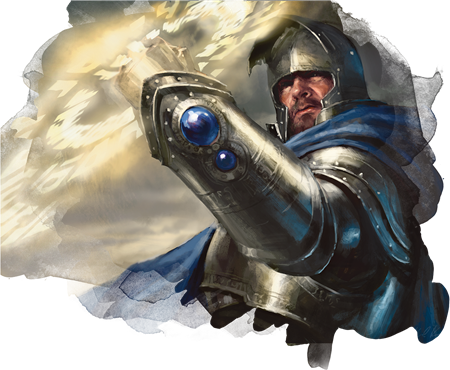 We’ve now completed a third rotation of the Player’s Handbook, meaning that almost every class has had every subclass from that book examined in the Class 101 series! Two classes with lots of subclasses—the cleric and wizard—will need a little extra time to cover. Starting this week, however, we’re moving away from the Player’s Handbook and taking a look at the brand-new subclasses that you’ll find in Tasha’s Cauldron of Everything!
We’ve now completed a third rotation of the Player’s Handbook, meaning that almost every class has had every subclass from that book examined in the Class 101 series! Two classes with lots of subclasses—the cleric and wizard—will need a little extra time to cover. Starting this week, however, we’re moving away from the Player’s Handbook and taking a look at the brand-new subclasses that you’ll find in Tasha’s Cauldron of Everything!
Our next new subclass from Tasha’s is a cleric whose devotion to order goes beyond righteousness, justice, and even the law itself. In some worlds, clerics of order are the enforcers of the law. In others, they may transcend mortal laws, and though they may work with lawmakers and peacekeepers, their devotion is not to the law of the land but to the highest ideal of order itself. This subclass originated in Guildmaster’s Guide to Ravnica, where its powers befitted the law enforcement arm of the Azorius Senate and the criminal enforcers of the Orzhov Syndicate.
Check out other articles in the Cleric 101 series, like our broad overview in Cleric 101: A Beginner’s Guide to Playing the Divine, and Cleric 101: Life Domain, Cleric 101: Knowledge Domain, and Cleric 101: Light Domain. If you’re interested in playing other classes, check out the entire Class 101 series.
Story of the Order Domain
“Halt, lawbreaker.” A man, armored from head to foot and obscured by a mask bearing a cold, impassive visage of steel, stood in the middle of a rainy city street, lit only by the flickering candlelight of the streetlamps. A thief dressed in simple street clothes over a suit of form-fitting leather armor, and holding a jingling sack of stolen gold turned to face him incredulously.
“Who the hell are you?” the thief took a cautious step back and scanned the heraldry on the cleric’s armor. “You’re not with the City Watch.”
“Nay.”
“And you can’t be a bounty hunter.”
“It is far too early for a price to be put on your head for a crime you’ve only just committed,” the cleric said with a laugh. But I would not accept a bounty, even if the Watch offered one.”
“Then who—what—in the Nine Hells are you? A mercenary…?”
The masked, armored figure laughed and took a step forward. The brass amulet around his neck gleamed as it caught the candlelight in a streetlamp—it bore an icon of a perfectly balanced set of scales. “I operate outside of the law. Higher than the law. I serve not the transient laws of mortalkind, but the ineffable order of the divine. I am not the law; I am a conduit for the righteous order of the cosmos.”
“You’re insane.” The thief’s heart was hammering in her chest, and she took another step back, turned, glanced over her shoulder, and then broke into a full run.
“And you are a fool.” The cleric’s voice echoed through the empty, lamp-lit streets, until the echo faded into the frantic, chaotic tattoo of raindrops striking the cobblestones. He raised a hand, and boomed, “I say again: Halt!” The single, commanding word rang out in the thief’s heart, and her steps slowed as its magic seized her will. The cleric’s metallic boots clacked against the stones, marking a stark, rhythmic contrast to the patter of the rain around him. The thief took a deep breath and screwed her eyes shut, drawing upon every ounce of composure she possessed and fought against the cleric’s spell, until—the magic snapped away, and her pace quickened again.
She turned about for a fraction of a second, just long enough to assess her pursuer’s location, pass a hand to her belt, and hurl a knife behind her as she took off again, this time diving for an alley. The knife whistled through the air and struck the cleric clean in his arm, which was covered only by a layer of padded cloth. The cleric of Order shouted in pain and stopped his inexorable march toward his quarry.
“You will obey me,” he growled, gritting his teeth as blood soaked his sleeve just as thoroughly as the rain. He reached out his unwounded arm and, with all five fingers outstretched, incanted another spell, then clenched his fingers shut. Suddenly, the thief’s muscles felt stiff as iron, and she froze. Momentum carried her forward, and her body crashed hard upon the rain-slick street.
The steady clacking of his boots rang out louder and louder until he was upon her. The cleric held out his good arm with his hand clenched in a paralyzing fist with every step, until he knelt down and used his wounded arm to turn her frozen face to stare into his metal mask, which was fashioned into a passive, even uncaring visage. Her face, too, was frozen in a mask of fear. She saw his breath misting out of his mask in the night air as he spoke in a low rasp.
“I am a conduit of divine order. And you will obey, thief.”
Order Domain Features
A divine domain is a suite of abilities innately tied to an aspect of a god’s divinity. A god may possess many domains within their expansive power, but a mortal being can only ever receive the powers of a single one. Clerics who receive the power of the Order Domain are arbiters of the law for the benefit of an orderly society. Some clerics of divine order are benevolent and kind, but just as many are cruel and draconian. Remember the classic D&D alignment chart; an Order cleric is fundamentally lawful by nature, but they may be good, evil, or anything in-between.
The cleric gains access to five subclass features at 1st, 2nd, 6th, 8th, and 17th level. You can read all of the Order Domain features in Tasha’s Cauldron of Everything. In summary, your subclass features allow you to:
- Gain proficiency with heavy armor and become a more commanding speaker
- Embolden your allies to attack whenever you target them with a spell
- Channel your god’s divine power to pacify nearby creatures
- Cast enchantment spells more quickly than usual
- Imbue your attacks with destructive power
- Curse targets when you damage them with your Divine Strike, causing them to take additional damage when your allies strike them
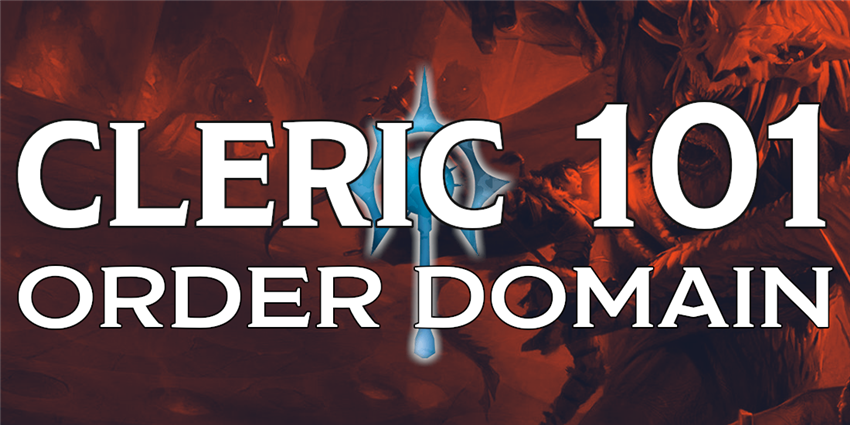
Benefits of the Order Domain
The Order Domain, like so many other subclasses in Tasha’s Cauldron of Everything, encourages you to use your powers for the benefit of your allies, not just yourself. Unlike most other classes who receive new subclasses in Tasha’s, however, the cleric class already focuses on supporting your entire party. Many of the Order Domain’s subclass features allow you to give your allies extra attacks or extra damage—essentially a boost to your overall damage, as long as you can coordinate with your teammates to take advantage of it.
Your 1st-level feature, Voice of Authority, is a prime example of this, giving you the unlimited ability to let an ally make an additional attack as a reaction whenever you target them with a spell of 1st-level or higher. This lets you focus on buffing your party with spells like bless and heroism, or healing them with spells like cure wounds and healing word, without forgoing the ability to deal damage on your turn. If you have a rogue in your party, healing them with cure wounds grants them an additional attack on your turn—which in turn lets them deal their Sneak Attack damage again, potentially causing a huge damage spike thanks to your healing!
Beyond this, your best features are ones that lock down foes, preventing them from moving, attacking, or otherwise causing trouble. Consider how these features interact with your character; are you a good guy who apprehends villains nonlethally so they may stand a fair trial, or are you a cruel authoritarian who uses these powers to make it easier to cause suffering for minor infractions?
Drawbacks of the Order Domain
As mentioned above, clerics of the Order Domain gain a great deal of power from coordinating with their allies—especially by giving allies a chance to attack as a reaction. If your party isn’t cohesive, or refuses to work with you as a team leader while in combat, some of your best features won’t work as intended. You can’t be a combat marshal if your allies won’t work together with you to gain a tactical advantage. Now, this may lead to some interesting ludonarrative assonance; an unruly party of players learns to make the most of your character’s powers, just as an unruly party of adventurers learns to work together tactically—but perhaps that’s being overly optimistic.
Additionally, some of your other best powers enhance your enchantment spells, making it easier to charm and befuddle foes. If your Dungeon Master runs a campaign that doesn’t play to your strengths, by running a game that’s all hack ‘n slash with no opportunity for social interaction or intrigue, you’ll find that some of your more interesting social features won’t have a chance to shine.
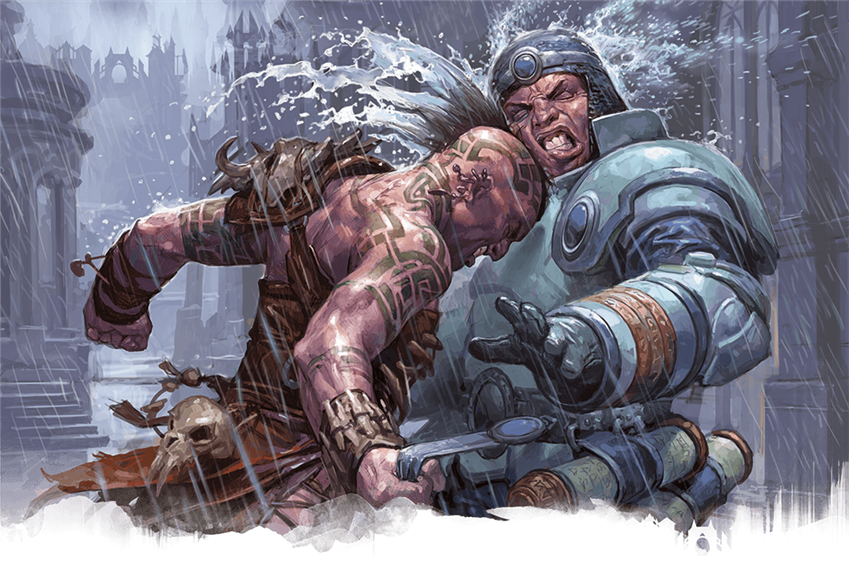
Suggested Build
As a cleric, you choose your subclass at 1st level. If you’re playing an Order Domain cleric, you’re likely going to be fighting toe-to-toe with foes, wielding melee weapons while armored to the gills in heavy armor. Because of this, you should play a race that improves your Wisdom score (to improve the power of your spells and class features) and your Strength score (to give you the strength to heft heavy armor and deal damage with melee weapons). However, thanks to the new “Customizing Your Origin” section in Tasha’s Cauldron of Everything, you don’t have to let your character’s race dictate their ability scores; you can reassign your racial ability score bonuses to any score you see fit.
If you’re playing without these new rules, there aren’t actually any races in the Player’s Handbook that give you bonuses to both Strength and Wisdom. Firbolgs from Volo’s Guide to Monsters do, but their nature-loving, easygoing ways make them an odd fit for the Order Domain. The same can be said for tortles from The Tortle Package, but likewise have an odd flavor clash. (Both of these races also appear in Explorer’s Guide to Wildemount.) If you’re playing in Ravnica, where the Order Domain originated, the centaur race has a natural bonus to both Strength and Wisdom—and their heavy, hammering hooves would seem to make them ideal candidates for a mounted police division in the city-plane of Ravnica. Likewise, the variant human race in the Player's Handbook is always a good choice.
Selecting EQUIPMENT when creating your cleric is a good idea; you’re proficient in heavy armor so you can select chainmail, but you aren’t proficient in martial weapons, so you can’t select a warhammer. Details like what type of holy symbol you wear are aesthetic decisions, and thus entirely up to you.

Spells
Fortunately, as a cleric, you have the entire cleric spell list available to you whenever you prepare spells at the start of the day. Nevertheless, when playing a cleric, it can help to have a typical spell list that your cleric always has prepared—unless you specifically choose otherwise. This can save you the trouble of having to re-select all your spells at the start of each day. Since your Domain Spells grant you a suite of useful combat spells, you may want to gear your spell selection towards spells that will help you in social or exploration scenarios.
As a 1st-level cleric, you know three cantrips and can prepare a number of 1st-level spells equal to 1 + your Wisdom modifier. Odds are, your Wisdom modifier will be either +2 or +3 right now, so you’ll be able to choose either three or four 1st-level spells whenever you complete a long rest. As a character that values both offense and support, the guidance and sacred flame cantrips will give you a little both that you can always rely on. Beyond this, your cantrips are simply a matter of preference, and almost any will serve you well.
You can prepare any 1st-level spells from the cleric spell list, but you can use this list of suggested spells to prepare an all-purpose spell loadout that will serve you in most circumstances. As you go on adventures and learn what dangers your character tends to face, you can personalize your spell loadout. Try to choose one spell labeled SUPPORT, one labeled DEFENSE, and one labeled OFFENSE. If you have a high Wisdom score and can prepare additional spells, choose others of your choice. Note that this list only includes some spells from the Player's Handbook and Tasha’s Cauldron of Everything, so if you want to choose more unusual spells, or have other sources like Xanathar's Guide to Everything, you'll have to do a little self-directed research. This list is just here to get you started if this is your first time playing an Order Domain cleric.

- Bless (SUPPORT)
- Bane (DEFENSE)
- Detect magic (EXPLORATION) [this spell can be cast a ritual, which means you can cast it without expending a spell slot, if you spend an extra 10 minutes casting it]
- Guiding bolt (OFFENSE)
- Healing word (SUPPORT)
- Inflict wounds (OFFENSE)
- Protection from evil and good (DEFENSE) [This spell requires that you have 25 gp worth of holy water, which the spell consumes]
- Shield of faith (DEFENSE)
Feats
Once you’ve improved your Wisdom score to 18 or 20, you can increase your power with a few useful feats. The following feats are good picks for Order Domain clerics, and will improve your reliability in your own desired area of expertise:
Crusher. This new feat from Tasha’s Cauldron of Everything gives you an edge when fighting with bludgeoning weapons. Most of the simple weapons you have access to are blunt weapons that synergize well with this feat—and its bonus effects are tactically useful in a way that clerics of the Order Domain appreciate, like forcing an enemy to move into a strategically disadvantageous position, or making it easier for your allies to hit them.
Fighting Initiate. This new feat from Tasha’s Cauldron of Everything makes you a more adept fighter. Since you’re going to be battling front-and-center with your allies often, it makes sense to give yourself an edge in combat.
Resilient (Constitution). You have a number of powerful spells that you must concentrate on to maintain. Taking damage in combat can spoil the full effects of a useful spell, so gaining proficiency in Constitution saving throws make you a much more reliable spellcaster!
War Caster. Just like Resilient (Constitution), War Caster makes you better able to maintain concentration on spells. The difference is that War Caster is specifically tailored to allow you to fight more easily while casting spells, whereas Resilient makes you tougher against all Constitution-related dangers, like poisons, certain spells, and so forth. Which do you choose? It depends on the kind of threats you’re facing in your campaign!
If you want more advice for building a cleric, check out Cleric 101. Have you ever played an Order Domain cleric? What advice would you give to players that want to make a character like this?
Create A Brand-New Adventurer Acquire New Powers and Adventures Browse All Your D&D Content
 James Haeck is the lead writer for D&D Beyond, the co-author of Waterdeep: Dragon Heist, Baldur's Gate: Descent into Avernus, and the Critical Role Explorer's Guide to Wildemount, a member of the Guild Adepts, and a freelance writer for Wizards of the Coast, the D&D Adventurers League, and other RPG companies. He lives in Seattle, Washington with his fiancée Hannah and their animal companions Mei and Marzipan. You can find him wasting time on Twitter at @jamesjhaeck.
James Haeck is the lead writer for D&D Beyond, the co-author of Waterdeep: Dragon Heist, Baldur's Gate: Descent into Avernus, and the Critical Role Explorer's Guide to Wildemount, a member of the Guild Adepts, and a freelance writer for Wizards of the Coast, the D&D Adventurers League, and other RPG companies. He lives in Seattle, Washington with his fiancée Hannah and their animal companions Mei and Marzipan. You can find him wasting time on Twitter at @jamesjhaeck.








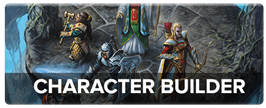
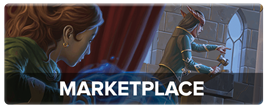
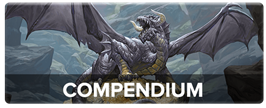
-
View User Profile
-
Send Message
Posted Dec 14, 2020I mainly read these for the little narrative excerpts in the beginning. They're always awesome, this one might be one of my favorites
-
View User Profile
-
Send Message
Posted Dec 14, 2020First?
Also, the human race gives you +1 on all attributes, therefore also to strength and wisdom.
-
View User Profile
-
Send Message
Posted Dec 14, 2020I can't help but want to play one of these guys. Lawful neutral is such an underrated alignment, especially since it limits freedom quite a bit, but if you lean into it, it can be highly rewarding. Also, I want to be able to revitalize my companions enough that they can attack with my cure wounds. This is listed as a drawback in the article, but I really see no drawback in being able to effectively both attack and heal on the same turn, potentially with an attack that is much more powerful than anything you could do.
-
View User Profile
-
Send Message
Posted Dec 14, 2020The ability to do so is listed as a benefit, the need to coordinate with your party as a drawback for uncoordinated parties. It's absolutely a playstyle thing. =)
-
View User Profile
-
Send Message
Posted Dec 14, 2020Clerics are often stereotyped as sticks in the mud with no senses of humor to begin with, but the Order domain takes it to new levels. I can't help but picture the standard Order cleric as being more or less continually pranked by the party's rogue, warlock, bard, or other more chaotically inclined classes.
-
View User Profile
-
Send Message
Posted Dec 14, 2020Yeah, I can picture that too.
-
View User Profile
-
Send Message
Posted Dec 14, 2020This domain resonates with my ideals. Also, if this isn’t showing up on your character builder, turn on Magic: The Gathering content. It was originally in the Guildmaster’s Guide To Ravnica.
-
View User Profile
-
Send Message
Posted Dec 14, 2020Great article! The story was really well-written today. Perhaps you could do Soul Knife for the next Rouge 101 and have that thief come back with psionic powers. Another feat could be Weapon Master, as it gives you proficiency with some martial weapons, increasing your damage output. I guess it's not a lot, but it is also fun for flavor, and you get a strength(or dex but probably strength) bonus out of it as well. I love the idea of one of these having a back-and-forth intraparty relationship with the rouge or bard. "Who put my shield in Lev's portable hole?!?!?" "Wasn't me!"(misty steps away) "Of course it was - come back here!"
Edit: Although of course with these intraparty roleplaying things, be careful keep the anger and tricks in-game and in-character.
-
View User Profile
-
Send Message
Posted Dec 14, 2020Cop priest > Soldier priest
-
View User Profile
-
Send Message
Posted Dec 15, 2020For anybody that remembers the Temple of Elemental Evil, Saint Cuthbert was absolutely an Order Domain Cleric.
-
View User Profile
-
Send Message
Posted Dec 15, 2020Order Domain Cleric doesn't get proficiency with martial weapons so you will end up doing a lot less damage with a spear than you will a cantrip like Toll The Dead. You only really need STR for wearing heavy armor, if you go for that over medium. I find It's better to boost CON for holding concentration on spells like Bless or Slow and surviving long enough to keep the buffs/debuffs flowing instead of burning your action trying to tackle a frontline combatants job without the proper tools.
while wielding a shield and spear with a +3 STR at 5th level you'll be doing 3.75 DPR against a 16 ac, compare to Toll The Dead's 5.4 on unwounded with a +2 Wis Save or a 7.8 on the same target that's missing hit points as magical damage. Using your 6th level power to cast Enchantment spells as a bonus action on your turn you can use a nearby ally to lower a target's hp with a bonus action Bless and then hit them with an empowered Toll The Dead on the same turn.
I've just started running an Order Domain Cleric and he doesn't even bother carrying weapons, that's what heavily armed
minionsfriends are for.-
View User Profile
-
Send Message
Posted Dec 15, 2020Does the Protection from Evil and Good have some sort of errata about the component?
The PHB simply lists it as holy water or powdered silver or iron, which the spell consumes. Since this has no spell cost attached, you can use a component pouch or material focus as an alternative due to the lack of cost attached - which is probably a better idea when there is no cost (I would presume you looked at the 25gp cost of holy water, or the Xanathar spell of Ceremony which requires 25gp of powdered silver, as inspiration for this reasoning.)
-
View User Profile
-
Send Message
Posted Dec 15, 2020Yeah I would just spell focus it
-
View User Profile
-
Send Message
Posted Dec 15, 2020I'm thinking of playing one of these in a campaign with my family, i'd be at level 4 and i can't decide on a feat i want. Crusher (for improved warhammer strikes {I have proficiency cuz i'm a dwarf}) or ritual caster (mostly for find familiar so i can do cure wounds and voice of authority from a range) Which one should i do?
-
View User Profile
-
Send Message
Posted Dec 15, 2020Are you currently more support or self-sufficient? Find Familiar is a really good combination with Cure Wounds, though, so I’d choose that.
-
View User Profile
-
Send Message
Posted Dec 15, 2020The really strange thing about Order Cleric is just how crazy they synergise with.. Aberrant Mind Sorcerer.
Order Clerics wants 2 things by 6th level - 1. enchantment spells worth turning into bonus spells, and 2. something to do with a bonus action when they cause the enemies to drop their weapons.
By mixing in 3 levels of Aberrant Mind Sorcerer you get 1. Dissonant whispers and 2. Shatter. So you can booming blade with your action, then dissonant whispers to trigger the damage with the first combo, and the second combo would be dropping their weapons, with a bonus action shatter to follow it up.
Obviously if you don't want to multiclass then Rakdos Cultist background provides you access to dissonant whispers, while simply picking up a single enemies weapon as part of your move action will suffice. (but, again, it's strange how order clerics synergise so much with their opposites... almost like a Paula Abdul single with a dancing cat)
-
View User Profile
-
Send Message
Posted Dec 15, 2020I just meant that as an order domain cleric, you're probably coordinating your party quite a bit. Also, who wouldn't want to get an extra attack and more HP on their turn? Even if the party isn't super cohesive, it would work OK. It is pretty playstyle-dependent though.
Edit: I'm kind of pumped that someone quoted me. I'm a relatively new D&D beyond user and didn't think it would happen this quickly!
-
View User Profile
-
Send Message
Posted Dec 15, 2020Yeah our party is a fighter, a monk, and a ranger (and me), so i should focus more on the spells.
-
View User Profile
-
Send Message
Posted Dec 15, 2020Seems good. Find Familiar + Cure Wounds is an amazing combo.
-
View User Profile
-
Send Message
Posted Dec 15, 2020Variant Human with Sentinel feat at first level is great for any cleric but it makes this subclass into an especially dangerous, powerful tank who your enemies won’t even want to approach